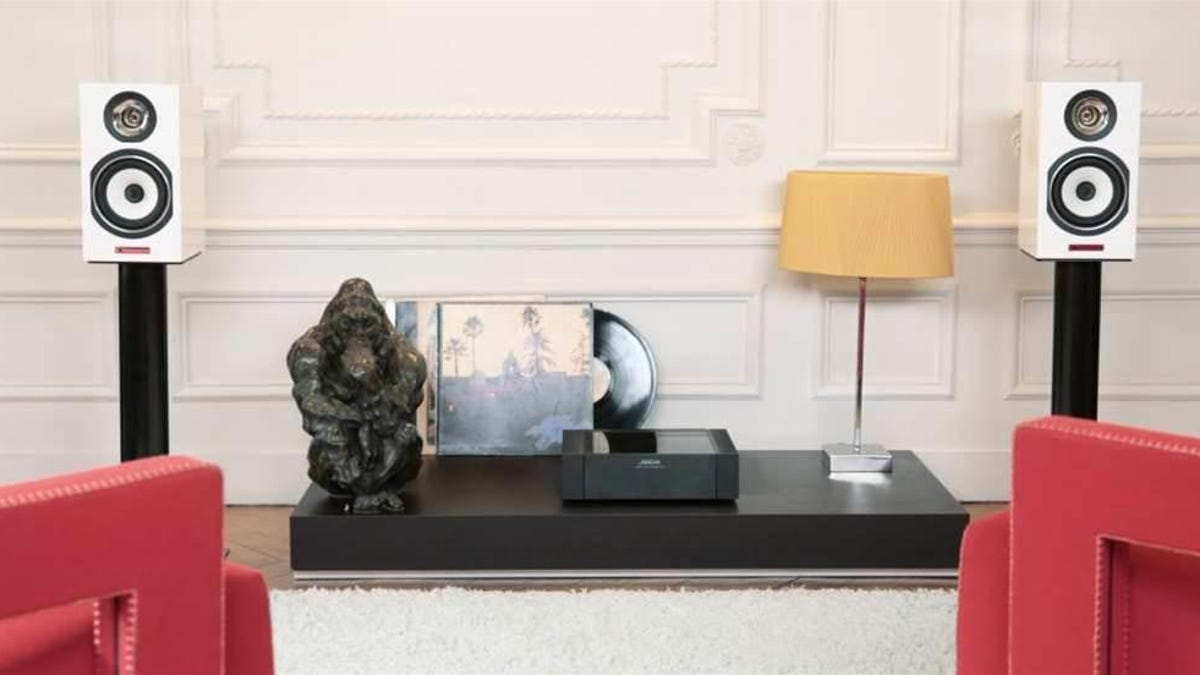Triangle’s pint-size speakers are high-end masters
The Audiophiliac’s ears-on review of the Triangle Esprit Titus EZ speakers.

The Triangle Esprit Titus EZ speakers
I've covered a lot of American and British audiophile speakers in my time, but French contenders, rarely. This one, the Esprit Titus EZ from Triangle HiFi may be the first I've heard from that company, but there will likely be many more. Triangle was founded in 1980 in France, how I overlooked Triangle this long is beyond me.
The Esprit Titus EZ is a small, two-way bookshelf design fitted with a 1-inch (25mm) horn loaded titanium tweeter and a 5-inch (127mm) cellulose midrange/woofer. Both drivers are designed in-house. There's a small bass port on the rear baffle, and some of the most beautifully crafted all-metal speaker cable binding posts I've ever seen.
The speaker is nice and compact, just 12 x 6.2 x 10.5 inches (306x167x257mm). My gleaming white Titus EZ samples had attractive, magnetically-attached white cloth grilles, but I listened with the drivers exposed. The Esprit EZ sells for $1,250 per pair in high-gloss black or white, $1,000 in vinyl walnut or black ash in the US; £620 and £740 respectively in the UK; AU$1,399 and AU$1,699 in Australia.
I don't recommend using the Titus EZ with receivers, unless they are rated to handle 4-ohm speakers. The Titus EZ is a small two-way speakers with 5 inch woofers and so you can't expect it to be a head banger's or party speaker.
Easy listening with the Titus EZ
The Titus EZ arrived on my doorstep right after the Wharfedale Linton Heritage speakers departed. The Lintons are much larger bookshelf speakers that retail for $1,198 a pair, in line with the Titus EZ pricewise. The Lintons make a ton of bass, play loud with ease, and they're more dynamically alive. Still, the Titus EZ was enjoyable and wholly satisfying, just on a smaller scale, and it would be a better fit for small to midsize rooms.
The Titus EZ has a sweet, beautiful tone that makes harsh recordings a little easier on the ears. It may be a horn speaker, but it's not about to threaten the Klipsch RP 600M horn speaker for dynamic "slam" or power, the Titus EZ is more polite than that.
One of my musician audiophile pals dropped by while I was working on the Titus EZ review, and while he can be pretty fussy about sound he was quite taken with the Esprit EZ. He was especially impressed with the way these speakers reproduced the sound of drums and cymbals. This speaker digs deep into the quieter detail of recordings, so you hear atmosphere of the recording venue or studio. The Titus EZ tweeter is clear and clean, but it's not going to make everyday, compressed recordings sound annoyingly harsh.
To test the Titus EZ's low-bass abilities I cued up Fabriclive. 54: David Rodigan, a tasty collection of classic reggae, dance hall and dub music. Definition and fullness were decent, but if you listen to a steady diet of bass-heavy music, plan on adding a subwoofer. Same as you would for any small speaker with a 5-inch woofer.
The KEF LS50 speaker is close to the same size as the 'EZ, but the LS50 is a little less sensitive, but somewhat more weighty-sounding speaker in the bass. Definition was better, too. Still, the Titus EZ sounded richer on male vocals, which subjectively warmed up the overall tonal balance. It's a mellower, more "relaxed"-sounding speaker. Stereo imaging was wide, but image focus wasn't as sharp as the LS50s'. I like both of these speakers, and they're both high-quality mini monitors so there's no easy call here.
I really enjoyed my time with the Triangle Esprit Titus EZ speakers. They're ideal for buyers craving a very musical, highly refined speaker for use with audiophile electronics in smaller spaces. I'm just starting with Triangle speakers; I hope to report on their higher-end Signature or Magellan series speakers later this year.

